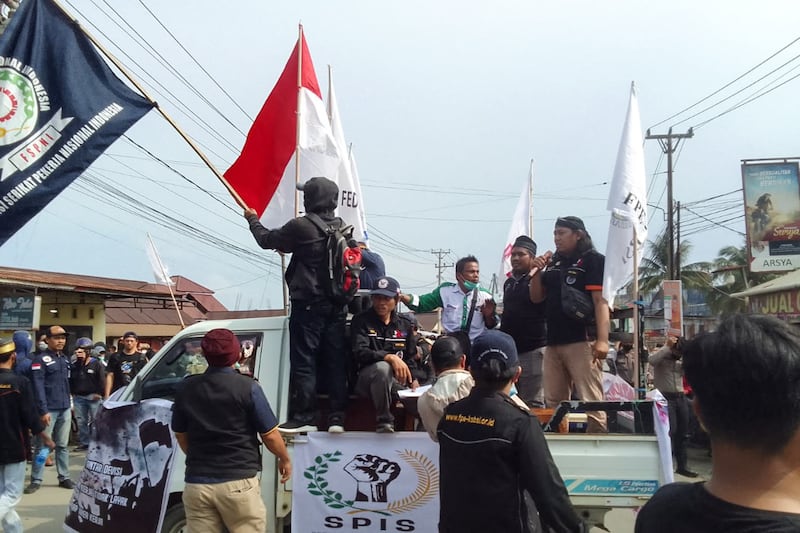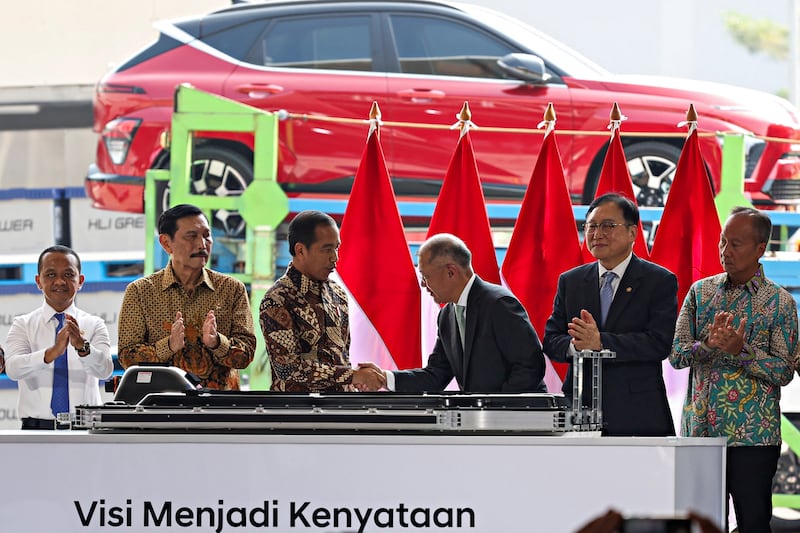Indonesia’s booming nickel industry, which is fuelled by massive Chinese investments, is marred by widespread corruption and illegal mining activities, both of which are closely linked to environmental damage, a new report launched Monday said.
And because Chinese firms benefit from such practices through their huge presence in the Indonesian nickel industry, their operations must constantly be scrutinized, said the study by the China-Global South Project (CGSP), a U.S.-based NGO.
The study found that about a third of more than 330 nickel mining and refining projects in Indonesia were involved in or accused of corruption and illegal mining activities.
“[C]orruption and environmental damage in Indonesia’s nickel industry have become closely linked: when a nickel mining company operates illegally, the local community and ecology tend to suffer,” the report said.
Illegal mining operations include instances where companies operate outside designated areas or with unresolved licensing issues, according to the report’s lead author, Antonia Timmerman.
“The widespread Chinese financing of the Indonesian nickel industry seems to have led some to grow wary of Chinese investors and their relationships with local officials, since local governments have been broadly criticized for corrupt business dealings,” the report said.
The nickel industry in Indonesia, the world’s leading producer of the resource, was driven by the rising global demand for electric vehicle batteries. The Southeast Asian nation aims to be a big player in that market by processing its raw nickel into battery components.
“Indonesia’s nickel industry could not have risen to the heights it has today without the help of Chinese investment,” the report stated at the outset.
About 90% of Indonesia’s nickel processing facilities are owned by Chinese companies, Indonesian government officials have said, the report noted, adding that this data is not made available to the public.
The report makes clear that corruption, environmental degradation, and social issues that plague the Indonesian nickel industry did not originate with Chinese businesses, but they do benefit from these practices.
“[N]ow that China has secured such a large stake in the industry, its outsized influence must be continuously scrutinized,” the report said.
“While there are serious concerns about China’s nickel industry practices, the bottom line is that China is the beneficiary of the poor practices of the Indonesian central government and political elite."

Local companies dominate nickel mining, but Chinese firms control almost all of Indonesia’s nickel processing industry, the report said.
These firms are able to exert outsized influence on the market, but their operations have raised questions about the sustainability of nickel industry practices, labor issues, and corruption, the report said.
Last year, an Indonesian worker and a Chinese national were killed when violence erupted at a nickel plant owned by a company from China in Morowali, Central Sulawesi province. The riot was fanned by an allegedly false rumor that Chinese employees had attacked their Indonesian counterparts who were protesting over wages and labor safety.
According to the Ministry of Manpower, there were more than 42,000 Chinese workers in Indonesia in 2022, accounting for about 44% of all expatriates in Indonesia.
An explosion at the Indonesia Morowali Industrial Park later in 2023 resulted in the deaths of 21 workers, raising serious concerns about safety practices within the industry.
The CGSP report documents instances where nickel companies allegedly coerced indigenous communities into selling ancestral lands, often with the support of Indonesian police and military personnel.
It cited the leader of a local workers' rights association, who spoke to the author of an article for the Carnegie Endowment for International Peace on the Indonesian government's alleged concessions made to Chinese firms investing in nickel processing.
The Indonesian interviewee told the author of the article: “[I]t is the policy of our government to allow more flexibility for Chinese investments; they can bypass many regulations,” and that Chinese investors “would rather disburse their money by bribing the local government than use it for developing good mining practices and health and safety standards.”
RELATED STORIES
[ China-owned nickel smelter in Indonesia resumes production after deadly riotOpens in new window ]
[ China-owned nickel smelter in Indonesia resumes production after deadly riotOpens in new window ]
[ Indonesia: Workers protest at China-owned smelter after deadly fireOpens in new window ]
The report said it was often extremely difficult to identify the actual shareholders of many nickel projects in Indonesia.
“A significant challenge in this sector is the pervasive opacity that shrouds its operations, making it difficult to obtain reliable information about its developments, citing intentionally complex or unclear ownership structures,” the report said.
“This makes it challenging for the public to hold anyone accountable when a project violates regulations,” Timmerman, the report’s author, told BenarNews.
She also said that researchers encountered difficulties in data collection, as the Indonesian government was often reluctant to share information.
BenarNews contacted officials at the Energy and Mineral Resources Ministry, but they could not be immediately reached for comment.
Last month, Indonesian President Joko “Jokowi” Widodo said that his 2020 ban on nickel ore exports and his policy requiring the resource’s processing at home had significantly increased state revenue.
“Some people have asked me, ‘Sir, the companies benefit the most; what do the people gain?’ Don’t be mistaken,” Jokowi told the Indonesian Economists Association last month.
“We collect taxes from there – corporate taxes, employee taxes, export duties, and non-tax state revenues, which are substantial.”
The government’s decision to ban the export of raw nickel ore, mandating domestic processing, has increased Indonesia’s nickel export values dramatically, rising to $34 billion in 2022 from U.S. $4 billion in 2017.
However, a study by the Centre for Research on Energy and Clean Air (CREA) released in February warned that the nickel industry’s heavy reliance on coal power could lead to at least 3,800 annual deaths by 2026 and nearly 5,000 by 2030, due to air pollution.
This projected public health crisis could cost the Indonesian economy between $2.63 billion and $3.42 billion annually over the same period, it said.

President-elect Prabowo Subianto, set to take office on Oct. 20, has pledged to elevate economic growth to 8% within three years by focusing on downstream industries, including nickel.
This ambitious target comes after Jokowi struggled to meet a 7% growth goal, with the economy remaining around 5% during his tenure.
Amid these challenges, Indonesia will have only 10 gigawatt-hours (GWh) of battery production capacity by the end of 2024, a mere 0.4% of the global total exceeding 2,800 GWh, the report predicted.
“[W]e found that the promise of downstreaming, namely the dream of processing raw nickel into electric vehicle batteries, has not yet been realized in real terms,” Timmerman said in a statement issued at the launch of the report.
“Despite the hype, most of Indonesia’s nickel still ends up as stainless steel, not batteries.”
